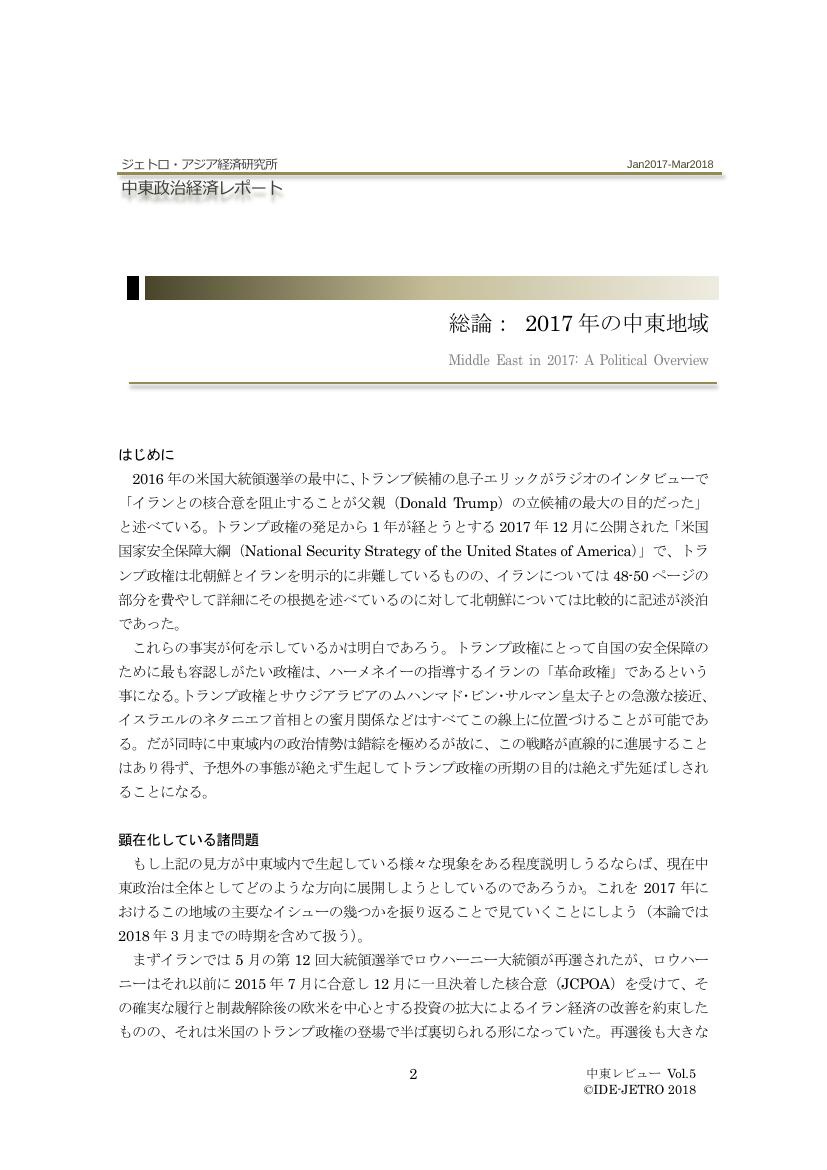25 0 0 0 OA なぜアメリカとトルコの関係は悪化したのか
- 著者
- 今井 宏平 イマイ コウヘイ Kohei Imai
- 雑誌
- 立教アメリカン・スタディーズ = Rikkyo American studies
- 巻号頁・発行日
- vol.40, pp.123-138, 2018
- 著者
- 今井 宏平
- 出版者
- 一般財団法人 日本国際政治学会
- 雑誌
- 国際政治 (ISSN:04542215)
- 巻号頁・発行日
- vol.2018, no.194, pp.194_46-194_61, 2018-12-25 (Released:2019-05-16)
- 参考文献数
- 52
This article examines how non-state actors struggle to rule the areas void of sovereignty. The areas void of sovereignty is not a new issue in international politics. There have been many such areas within weak states. Traditionally, the existence of such areas has been a domestic, not an international, matter. However, the recent trend of globalization and its effects have changed the situation. For example, the Islamic State (IS), which emerged along the Iraqi-Syria border, recruited international fighters from all over the world using the internet and social media. As a result, the existence of ungoverned territories became known all over the world. Hence, the struggle to establish control over these areas void of sovereignty is deeply related to the stability of international order. In Iraq and Syria, IS, the Kurdish Regional Government (KRG), and the Democratic Union Party (PYD) all sought to control the ungoverned territory. On the one hand, IS attempted to establish a sovereign state based on jihadist ideology. On the other hand, the global community supported the KRG and the PYD to combat IS. The legitimacy of the KRG and PYD in international politics increased during the war on IS. In 1991, at the end of the Gulf War, the KRG established a de facto autonomy in northern Iraq; its formal autonomy was recognized by the Iraqi central government in 2004. For the KRG leadership, the war against IS was looked upon as a rare opportunity to achieve independence. Hence the KRG quickly held the independence referendum on September 25, 2017. However, the neighboring countries (Turkey and Iran), the patron state (the United States), and the parent state (Iraq) all opposed this referendum and the KRG’s independence. After the independence referendum failed, KRG lost the disputed territory in Iraq and its relationships with neighboring countries deteriorated. The PYD is an organization that operates under the Kurdistan Communities Union (KCK), the umbrella group for managing the mobilization of Kurds across the Middle East. PYD became the leading Kurdish group in Syria because its military unit, the People’s Protection Units (YPG), gained the support of the United States and its allies in the war against IS. However, Turkey views the PYD as part of the Kurdistan Workers Party (PKK), an illegal, armed group in Turkey. Hence, Turkey continues to battle the PYD in northern Syria.As a result, no actor can fully control the areas void of sovereignty in Iraq and Syria. However, exploring the cases of the KRG and PYD shows how maintaining good relations with neighboring states is a condition for the survival of non-state actors.
4 0 0 0 OA インタビューで知る研究最前線 第5回 ソ連解体30年① 中東民族問題研究の視点から
- 著者
- 立花 優 鶴見 太郎 山口 昭彦 今井 宏平 岩﨑 葉子
- 出版者
- 独立行政法人 日本貿易振興機構アジア経済研究所
- 雑誌
- アジア経済 (ISSN:00022942)
- 巻号頁・発行日
- vol.62, no.3, pp.63-90, 2021-09-15 (Released:2021-09-28)
- 著者
- 今井 宏昌
- 出版者
- 日本ドイツ学会 ; 1990-
- 雑誌
- ドイツ研究 = Deutschstudien (ISSN:13441035)
- 巻号頁・発行日
- no.53, pp.95-99, 2019
最終年度である平成28年度は、成果の発表につとめると同時に、前年度に引き続き、ヨーロッパや日本国内の古書店、大学図書館のデータベースを利用し、研究テーマに関連する文献の調査・収集をおこなったほか、平成28年8月8日から9月1日にかけて、ドイツで文書館史料の調査・収集をおこなった。具体的な成果としては、まず博士論文を単著『暴力の経験史:第一次世界大戦後ドイツの義勇軍経1918~1923』(法律文化社、2016年)として出版したことが挙げられる。この出版により、ドイツ義勇軍の経験が戦間期のドイツ・ヨーロッパ史に与えたインパクトとともに、本研究が重視する「経験史[Erfahrungsgeschichte]」の分析視角をより広くの人びとに知らせることができた。また「経験史」に関してはさらに、T・キューネ/B・ツィーマン編『軍事史とは何か』(原書房、2017年)を共訳書として発表した。特筆すべき研究の進展としては、義勇軍経験をめぐる史料の「発掘」と収集が挙げられる。ザクセン州立ライプツィヒ文書館では、義勇軍出身のナチ党員であるH・O・ハウエンシュタインが1926 年11 月にヒトラー率いる党中央から離反する形で結成したドイツ独立国民社会党の機関誌『ドイチェ・フライハイト』の1927 年5 月22 日号を「発掘」し、組織の中で明確に義勇軍経験が意識されていた点が明らかとなった。さらにマールブルクのヘルダー研究所では、義勇軍雑誌『ライター・ゲン・オステン』の大部分を収集することに成功し、これによりバルト地域を中心とする義勇軍運動の記憶がナチズムに接収されていく過程を跡づけるための前提条件が整った。ただ、これらの史料「発掘」と収集により、論文執筆スケジュールに大幅な変更が生じ、結果として平成28 年度中に雑誌論文としての成果の発表には至らなかった。
2 0 0 0 OA 2017年の中東地域
- 著者
- 鈴木 均 池内 恵 池田 明史 福田 安志 土屋 一樹 今井 宏平 高橋 理枝
- 出版者
- 独立行政法人 日本貿易振興機構アジア経済研究所
- 雑誌
- 中東レビュー (ISSN:21884595)
- 巻号頁・発行日
- vol.5, pp.2-48, 2018 (Released:2019-03-15)
2 0 0 0 OA 反基地運動はなぜ起こるのか/活性化するのか ―トルコの事例の比較分析―
- 著者
- 今井 宏平
- 出版者
- 国際安全保障学会
- 雑誌
- 国際安全保障 (ISSN:13467573)
- 巻号頁・発行日
- vol.47, no.3, pp.17-34, 2019-12-31 (Released:2022-03-14)
2 0 0 0 OA T・B・マコーリー断章(岩間徹教授退職記念)
2 0 0 0 OA 明治時代におけるホイッグ史観の受容
- 著者
- 今井 宏
- 雑誌
- 東京女子大學附屬比較文化研究所紀要
- 巻号頁・発行日
- vol.35, pp.1-19, 1974-01
This is a sequel to my two previous articles, "Japanese Views on the English Revolution in the Meiji Era", (Publications of the Institute for Comparative Studies of Culture, Vol. 26, 1968) and "Japanese Views on Puritanism in the Meiji Era" (Ibid., Vol. 32, 1972). In the former articles, I made surveys on books which contributed to develop Japanese understanding of the Revolution in the 17 th century England and then I laid stress on the point that the knowledge of the English Revolution in Meiji Japan was an adaptation of the Whig interpretation of British history to the Japanese political situation of the time. From this point of view, to know how this interpretation of British history was introduced into Meiji Japan would be one of the essential problems, but it is strange enough that we cannot find out in the Meiji era any translation of the most important historical book of the school, T. B. Macaulay's History of England. In his autobiography, Sohd Tokutomi, the leader of the Minyu-sha group and later days ultra-nationalist, remembered his enthusiastic reading of Macaulay's Essays and History in his youth. We can easily perceive that his early writings were deeply influenced by Macaulay's interpretation of history, because Tokutomi not only shared the optimistic progressivism with him but also used such clear-cut two-polars conceptions as good and evil, liberty and tyranny and so on. In 1890 the first Japanese biography of Macaulay was written by Yosaburo Takekoshi, one of Tokutomi's partners, but though being a good introduction to Macaulay's personality and achivements, this biography clearly depicts him as a historian who wrote history with an excellent literary talent but undeservedly neglects to consider the significance of his logics. This one-sidedness of the introduction of Whig interpretation has cast its shadow over the Japanese understanding of British historiography.
2 0 0 0 IR トルコはなぜナゴルノ・カラバフ紛争に関与するのか
- 著者
- 今井 宏平
- 出版者
- 日本貿易振興機構アジア経済研究所
- 雑誌
- IDE スクエア -- 世界を見る眼
- 巻号頁・発行日
- pp.1-6, 2020-10
2 0 0 0 OA アメリカの中東政策とトルコ外交-「ミドル・パワー」の機能と限界-
- 著者
- 今井 宏平
- 出版者
- JAPAN ASSOCIATION OF INTERNATIONAL RELATIONS
- 雑誌
- 国際政治 (ISSN:04542215)
- 巻号頁・発行日
- vol.2007, no.150, pp.186-202,L18, 2007-11-28 (Released:2010-09-01)
- 参考文献数
- 52
The aim of this paper is to explore how Turkey contributes to American foreign policy during the Post-Cold War era, especially Middle Eastern dimension.The discussion has three parts. Firstly, this deals with American foreign policy toward the Middle East during Post-Cold War era and demonstrates American failure. Since the collapse of the Soviet Union, international order started to change and the United States intensified its hegemonic power. But America failed to manage Iraq War, and Middle East region is becoming disorder and nest of terrorism. Furthermore, Anti-Americanism is spreading rapidly in this region. The United States is coming to reach a deadlock.Secondly, Turkey will be situated “Transmission Middle Power” after Iraq War. Since the word of “Middle Power” is ambiguous, it has to be conceptualized at first. In this paper, “Middle Power” is classified as “Classical Middle Power”, “Functional Middle Power” and “Transmission Middle Power”. Historically, Turkey has been described as “Middle Power”. However, its role and quality of power have been changed by relationship of Great Power and international structure. Now, Turkey pioneers “Transmission Middle Power” by using historical and cultural factors.Thirdly, this focuses on American-Turkish relations. Since both states faced the Soviet threat during the Cold War period, Turkey contributed American containment policy. The end of bipolar system, however, changed their relationships. During the Gulf War, Turkey assisted the United States through economic sanction against Iraq and offered the multinational force to military bases. Turkey acted as “Classical Middle power” in the Cold War era. But after the Gulf War, both countries disagreed with OPC (Operation Provide Comfort) and OPCII in Northern Iraq. In Iraq War, Turkey did not offer to military bases. This was watershed of American-Turkish relations. After this decision, Turkey seeks to contribute to Middle Eastern stability as “Transmission Middle Power”. In particular, the Broader Middle East and North Africa (BMENA) is a good deliberative place among Middle Eastern countries to prevail democracy. Turkey is one of chair countries in Democracy Assistance Dialogue (DAD), which is a component of BMENA..In conclusion, Turkey is “Middle Power” so it has to keep good relationships with the United States to spread its influence toward International politics in the Post-Cold War era. However, the forms of cooperation have changed all the time by international affairs and structure. Now, “Transmission Middle Power” is the best form both America and Turkey.
2 0 0 0 OA バイオミネラルにまなぶ材料化学
2 0 0 0 古代のローマ水道 : フロンティヌスの『水道書』とその世界
1 0 0 0 OA クルド系アクターが国際秩序の安定化/不安定化に与えるインパクトに関する研究
本研究では、国家をもたない世界最大の民族と言われ、イラク、イラン、シリア、トルコに跨って居住しているクルド人に注目し、クルド人の非政府主体が現在の国際秩序に与えるインパクトを検討した。本研究は研究目的達成のために実証分析と理論分析の2段階で検証を行った。実証分析に関しては、クルド人の活動に関する詳細な分析、そして武装組織の実態、紛争解決に向けた手段、そして紛争後の和解に至るプロセスに関する分析を行なってきた。また、国際関係論、政治学、社会学の理論もしくは概念を実証研究のために掘り下げた。本研究の最終的な成果が『クルド問題:非国家主体の可能性と限界』(岩波書店、2022年2月)である。
1 0 0 0 OA 【トルコ地方選挙】トルコにおける2019年3月の地方選挙の展望
- 著者
- 今井 宏平
- 出版者
- 独立行政法人 日本貿易振興機構アジア経済研究所
- 雑誌
- 中東レビュー (ISSN:21884595)
- 巻号頁・発行日
- vol.6, pp.6-11, 2019 (Released:2019-05-30)
1 0 0 0 OA 総論:2016年の中東地域
- 著者
- 鈴木 均 池内 恵 池田 明史 土屋 一樹 今井 宏平
- 出版者
- 独立行政法人 日本貿易振興機構アジア経済研究所
- 雑誌
- 中東レビュー (ISSN:21884595)
- 巻号頁・発行日
- vol.4, pp.2-22, 2017 (Released:2019-11-12)
1 0 0 0 アイデンティティから読み解くトルコ外交
- 著者
- 今井 宏平
- 出版者
- 一般財団法人 日本国際政治学会
- 雑誌
- 国際政治 (ISSN:04542215)
- 巻号頁・発行日
- vol.2022, no.207, pp.207_173-207_182, 2022-03-30 (Released:2022-03-31)
- 参考文献数
- 31
- 著者
- ツィーマン ベンヤミン 今井 宏昌 西山 暁義
- 出版者
- 現代史研究会
- 雑誌
- 現代史研究 = Journal of modern and contemporary history (ISSN:03868869)
- 巻号頁・発行日
- no.66, pp.1-14, 2020
- 著者
- 今井 宏昌
- 出版者
- 歴史科学協議会
- 雑誌
- 歴史評論 = Historical journal (ISSN:03868907)
- 巻号頁・発行日
- no.843, pp.42-54, 2020-07







